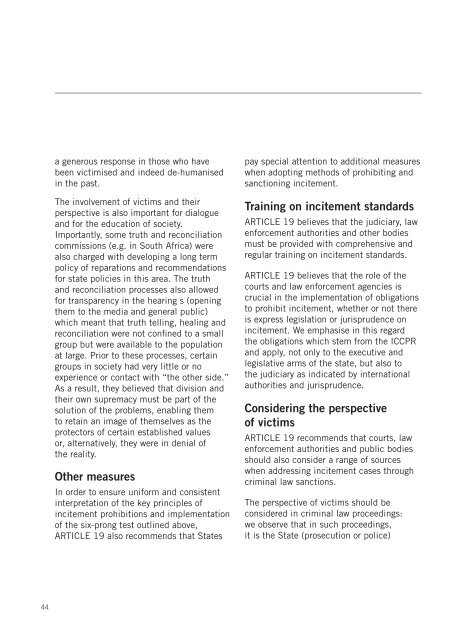ARTICLE-19-policy-on-prohibition-to-incitement
ARTICLE-19-policy-on-prohibition-to-incitement
ARTICLE-19-policy-on-prohibition-to-incitement
You also want an ePaper? Increase the reach of your titles
YUMPU automatically turns print PDFs into web optimized ePapers that Google loves.
a generous resp<strong>on</strong>se in those who have<br />
been victimised and indeed de-humanised<br />
in the past.<br />
The involvement of victims and their<br />
perspective is also important for dialogue<br />
and for the educati<strong>on</strong> of society.<br />
Importantly, some truth and rec<strong>on</strong>ciliati<strong>on</strong><br />
commissi<strong>on</strong>s (e.g. in South Africa) were<br />
also charged with developing a l<strong>on</strong>g term<br />
<str<strong>on</strong>g>policy</str<strong>on</strong>g> of reparati<strong>on</strong>s and recommendati<strong>on</strong>s<br />
for state policies in this area. The truth<br />
and rec<strong>on</strong>ciliati<strong>on</strong> processes also allowed<br />
for transparency in the hearing s (opening<br />
them <strong>to</strong> the media and general public)<br />
which meant that truth telling, healing and<br />
rec<strong>on</strong>ciliati<strong>on</strong> were not c<strong>on</strong>fined <strong>to</strong> a small<br />
group but were available <strong>to</strong> the populati<strong>on</strong><br />
at large. Prior <strong>to</strong> these processes, certain<br />
groups in society had very little or no<br />
experience or c<strong>on</strong>tact with “the other side.”<br />
As a result, they believed that divisi<strong>on</strong> and<br />
their own supremacy must be part of the<br />
soluti<strong>on</strong> of the problems, enabling them<br />
<strong>to</strong> retain an image of themselves as the<br />
protec<strong>to</strong>rs of certain established values<br />
or, alternatively, they were in denial of<br />
the reality.<br />
Other measures<br />
In order <strong>to</strong> ensure uniform and c<strong>on</strong>sistent<br />
interpretati<strong>on</strong> of the key principles of<br />
<strong>incitement</strong> prohibiti<strong>on</strong>s and implementati<strong>on</strong><br />
of the six-pr<strong>on</strong>g test outlined above,<br />
<str<strong>on</strong>g>ARTICLE</str<strong>on</strong>g> <str<strong>on</strong>g>19</str<strong>on</strong>g> also recommends that States<br />
pay special attenti<strong>on</strong> <strong>to</strong> additi<strong>on</strong>al measures<br />
when adopting methods of prohibiting and<br />
sancti<strong>on</strong>ing <strong>incitement</strong>.<br />
Training <strong>on</strong> <strong>incitement</strong> standards<br />
<str<strong>on</strong>g>ARTICLE</str<strong>on</strong>g> <str<strong>on</strong>g>19</str<strong>on</strong>g> believes that the judiciary, law<br />
enforcement authorities and other bodies<br />
must be provided with comprehensive and<br />
regular training <strong>on</strong> <strong>incitement</strong> standards.<br />
<str<strong>on</strong>g>ARTICLE</str<strong>on</strong>g> <str<strong>on</strong>g>19</str<strong>on</strong>g> believes that the role of the<br />
courts and law enforcement agencies is<br />
crucial in the implementati<strong>on</strong> of obligati<strong>on</strong>s<br />
<strong>to</strong> prohibit <strong>incitement</strong>, whether or not there<br />
is express legislati<strong>on</strong> or jurisprudence <strong>on</strong><br />
<strong>incitement</strong>. We emphasise in this regard<br />
the obligati<strong>on</strong>s which stem from the ICCPR<br />
and apply, not <strong>on</strong>ly <strong>to</strong> the executive and<br />
legislative arms of the state, but also <strong>to</strong><br />
the judiciary as indicated by internati<strong>on</strong>al<br />
authorities and jurisprudence.<br />
C<strong>on</strong>sidering the perspective<br />
of victims<br />
<str<strong>on</strong>g>ARTICLE</str<strong>on</strong>g> <str<strong>on</strong>g>19</str<strong>on</strong>g> recommends that courts, law<br />
enforcement authorities and public bodies<br />
should also c<strong>on</strong>sider a range of sources<br />
when addressing <strong>incitement</strong> cases through<br />
criminal law sancti<strong>on</strong>s.<br />
The perspective of victims should be<br />
c<strong>on</strong>sidered in criminal law proceedings:<br />
we observe that in such proceedings,<br />
it is the State (prosecuti<strong>on</strong> or police)<br />
44


